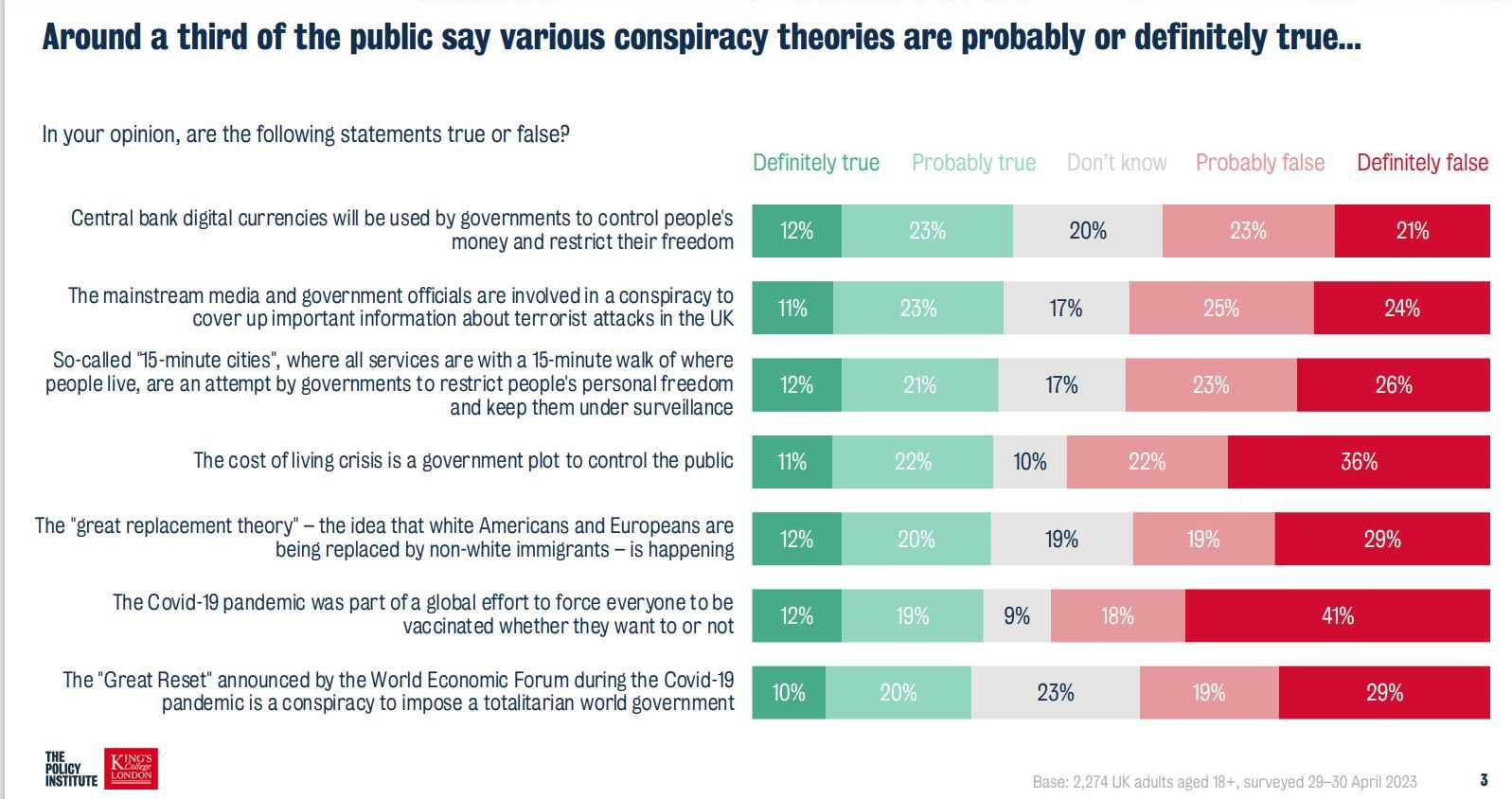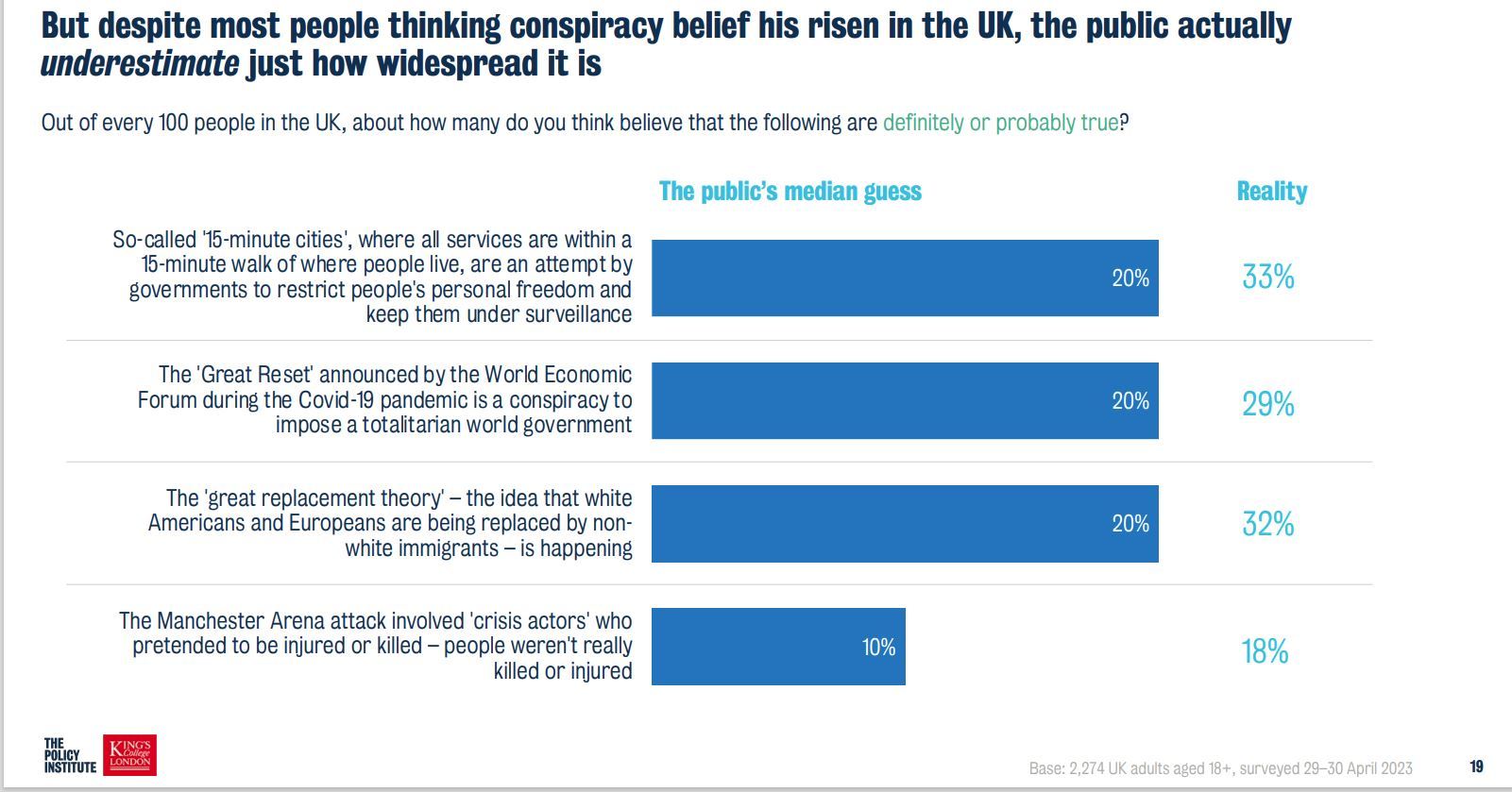Quarter of UK population believes Covid pandemic ‘was a hoax’
Almost a quarter of the UK population believe Covid-19 was probably or definitely a hoax, new polling has revealed.
The findings, which come from an April survey by Savanta for King’s College London (KCL) and the BBC, were published as the UK’s public inquiry into the pandemic gets under way.
The survey also found about a third of the population are convinced that the cost of living crisis is a government plot to control the public.
Similar numbers believe “15-minute cities” – an attempt to increase walking in neighbourhoods – are a government surveillance ruse.

 King’s College London
King’s College LondonThe report found as many as one in three people in the UK say conspiracies often promoted by some alternative media sources are true.
Those include the “great replacement theory” – which suggests white people are being replaced by non-white immigrants – and that central bank digital currencies will be used to restrict people’s freedom.
And with concerns that the pandemic has fuelled conspiracy belief in the UK, one in three (33%) say they are now less likely to believe official information because of how government and the media behaved during Covid – almost double the proportion who say the opposite (18%).
Meanwhile, the majority of the public (58%) say conspiracy belief is higher today than it was 20 years ago, but there is little evidence from academic studies that it has actually increased.
The report found beliefs were shared through social media – most commonly YouTube and Facebook – and fuelled by websites including 21st Century Wire, The Light, The Exposé and Breitbart, the last of which was run by Donald Trump’s former adviser Steve Bannon.
One in seven people – about six million adults – believe violence is a fair response to some alleged conspiracies.
And researchers say the general public underestimates the number of conspiracy theorists by approximately four million adults.
Professor Bobby Duffy, director of the Policy Institute at King’s College London, said: “It’s always shocking to see quite how widespread some conspiracy beliefs are, but it’s perhaps even more worrying how many people say they’d be willing to act on them.
“Of course, protest is a key part of a healthy democracy and people will have sometimes legitimate concerns about the motivations behind government and others’ actions – but it’s worrying that around one in seven say that violence would be acceptable in protests against, for example, government digital currencies or 15-minute cities.
“This tipping into violent action from a relatively small but still significant minority is perhaps the real concern here, more so than a general expansion of belief in conspiracies.
“Six in ten of the public think conspiracy belief is higher today than it was 20 years ago, but there is very little evidence from long-term trends that this is the case.
“It will no doubt feel like that partly because we are more likely to see conspiracies shared on social media than in the past, and the study confirms how important these outlets are to conspiracy spreading – but that doesn’t automatically mean more and more people are being pulled into conspiracy belief.”
One in three (33%) people say they are now less likely to believe official information because of how government and the media behaved during Covid – almost double the proportion who say the opposite (18%).
A clear majority (58%) of the public say conspiracy belief is higher than it was 20 years ago, with three-quarters (73%) saying they think social media has contributed to this rise.

 King’s College London
King’s College LondonDr Rod Dacombe, reader in politics in the Department of Political Economy at King’s College London, said: “This research provides new insights into belief in conspiracy theories in the UK and highlights the importance of alternative media in disseminating and reinforcing them – for example, we find that people who get much of their news from certain outlets are far more likely to believe in a range of conspiracies.
“Nevertheless, it’s important not to overstate the influence of some sources relative to others, as it’s clear from this study that social media is still the main way people first learn of these kinds of theories.
“We also see that relatively large sections of the population can be motivated to act on such beliefs, with around a quarter of the public saying they have taken part in, or would be prepared to take part in, direct action over conspiracist causes.
“Here, too, there is a strong association between use of alternative media and likelihood of participating in protests and rallies. Worryingly, of those who would be willing to take part, the majority believe that violence could be justified.
“These findings underline the importance of conspiracy theories in explaining how many people understand politics and the events which shape their lives.
“For some people, conspiracy theories provide the main focus of political participation and the primary means through which they understand what is going on in the world.”


